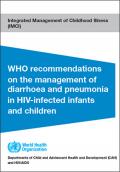Guidelines - Released in 2010
The main causes of death among children under 5 years of age are acute respiratory infection (17%) and diarrhoeal disease (16%), and children infected with human immunodeficiency virus (HIV) have greater morbidity and mortality related to these conditions (WHO, 2008).
The World Health Organization (WHO) departments of Child and Adolescent Health and of HIV/AIDS reviewed the evidence on management of diarrhoea and pneumonia in HIV-infected children, because of the substantial effects of these conditions on morbidity and mortality, potential differences in etiological agents (and thus in recommended empirical regimens) from those for uninfected infants and children, potential changes in the susceptibility of pathogens to co-trimoxazole prophylaxis in these children, and the lack of specific recommendations for this high-risk group. These guidelines are part of a comprehensive set of normative documents being prepared by WHO for the prevention and treatment of common conditions affecting HIV-infected and -exposed infants and children.
Downloads
Organizations
- World Health Organization (WHO)






